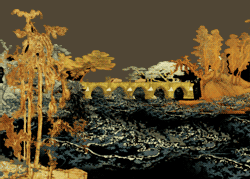List of films
Tribute to Hou Hsiao-hsien
 Three Times / Zuihaode Shiguang Three Times / Zuihaode Shiguang
Taiwan, 2005, 135 min.
Mandarin / English subtitles
Režie / Director:
Hou Hsiao-hsien
Scénář / Screenplay:
Chu Tien-wen
Kamera / D. o. P.: Pin Bing Lee
Produkce / Production:
Sino Movie
Hrají / Cast:
Shu Qi, Chang Chen, Mei Fang, Liao Su-jen, Di Mei
The director's most recent film tells three different stories from three different time periods. 1966 is depicted through the story of an unfulfilled love of a soldier and a barmaid. Then we move to 1911, when a young prostitute enters a tea-growing family. In 2005, we follow the story of singer Ying, who is losing her eyesight and lives with her female lover Micky. Their lives are invaded by Zhen and his girlfriend Blue. This unconventional and nearly monumental span of three different eras fascinates not only by the way the protagonists and their different time periods are portrayed, but also by the emphasis on description of the dynamic changes, which totally changed the world during the past 90 years.
Hou Hsiao-Hsien (1947)
The first story of the film is based on the authors memory of a smoky pool bar. The part uses a human story to return to a dramatic moment in Taiwanese history and the third part again portrays a lost generation which, starting with fascination with drugs and electronic music, searches for a way to deal with the world at its hands. It may seem as if another part of HHH's career was closing with a film referencing many of his former works. Still, it appears that the author remains a strong name to his audience, the critics as well as his peer cinematographers. He is currently shooting a new film in Paris.
 Café Lumičre / Kôhî jikô Café Lumičre / Kôhî jikô
Japan / Taiwan, 2003, 103 min.
Japanese, English / English subtitles
Režie / Director:
Hou Hsiao-hsien
Scénář / Screenplay:
Hou Hsiao-hsien, Chu T´ien-wen
Kamera / D.o.P.:
Pin Bing Lee
Produkce / Production:
Shochiku Company, Asahi Shimbunsha, Sumitomo Corporation
Hrají / Cast:
Hitoto Yo, Asano Tadanobu, Hagiwara Masato, Yo Kimiko, Kobayashi Nenji
Apart from being an intimate portrait of the young Japanese woman Yoko, this film is also a tribute to the important Japanese filmmaker Yasujiro Ozuo on the occasion of the year of his 100th birthday. Working on a book on a cult musician of the 30-ies, Juang Wenye, Yoko meets the antique-shop owner Hajim thanks to whom she grows to realize that he life strained between Yoko's countryside family, her friends and her work is too hectic. At the same time she finds out that she is pregnant with somebody she doesn't love and she realizes she would like to change her life. The subtle story is told as a fascinating adventure of searching for one's own identity in a modern city full of high-speed trains.
Hou Hsiao-Hsien (1947)
The open inspiration by Yasujiro Ozuo's films is just another proof an outstanding talent of the director who values highly not only personal style, but also historical memory - not only the "great" one, but also the cinematic one. The author's fascination with trains and other modern high-tech elements definitively blends with his fascination for the brittle human soul continuously subjected to severe trials of the modern times.
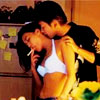 Millennium Mambo / Qianxi manbo Millennium Mambo / Qianxi manbo
Taiwan / France, 2001, 119 min.
Mandarin / English subtitles
Režie / Director:
Hou Hsiao-hsien
Scénář / Screenplay:
Chu T'ien-wen
Kamera / D.o.P.:
Pin Bing Lee
Produkce / Production:
3H Productions, Orly Films, Paradis Films
Hrají / Cast:
Shu Qi, Kao Jack, Tuan Chun-hao, Chen Yi-Hsuan, Takeuchi Jun, Niu Doze
The structure of this surprising film about youth radically differs from anything you might know. We follow the story of Vicky, who acts as a narrator in telling us beforehand what is going to happen in the film, immerses herself into the world of her personal feelings and experience and aided by fascinating cinematography, opens a game of returning to sensuous, intoxicating and most of all, intensive perception of the world around us. Vicky is an ordinary younger girl, who loves lovemaking, techno music and parties. However soon, she fonds out that she doesn't want to continue this emptied and boring life and sets out on a journey, which leads her all the way to distant Japan until she fully opens her eyes and starts living a full life.
Hou Hsiao-Hsien (1947)
After a series of mostly historical films gathering awards at festivals in Venice, Berlin and Cannes in the late 80-ies and throughout the 90-ies, the work of HHH radically transforms. Millenium Mambo goes to the edge of radical experimentation, where image and sound layer to copy emotional states of the human body. The film shocked movie fans and professionals worldwide and at the same time proved, that HHH is one of the leading figures of current cinematography.
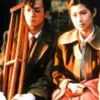 A City of Sadness / Beiqing chengshi A City of Sadness / Beiqing chengshi
Hong Kong / Taiwan, 1989, 157 min.
Taiwanese, Mandarin, Japanese, Chinese / Czech subtitles
Režie / Director:
Hou Hsiao-hsien
Scénář / Screenplay:
Chu T'ien-wen, Wu Nien-Jen
Kamera / D.o.P.:
Chen Hwa-in
Produkce / Production:
Chiu Fu-Sheng
Hrají / Cast:
Chen Sung Young, Fang Wou Yi, Ikuyo Nakanuta, Kao Jack
This epic story follows the fate of a Taiwanese family after the end of the Japanese occupation of the island at the end of World War II. Historical events freely mix with a fictional story of four brothers and their old father. One of the brothers owns a bar and remodels it according to the needs of the new times, another gets into drug dealing, the third hasn't returned from war and the forth, deaf brother owns and antique book store and is active in the patriotic movement. This masterfully shot film was created when censorship was freshly lifted in Taiwan and thus represents the author's first attempt at openly reflecting no-so-distant history.
Hou Hsiao-Hsien (1947)
HHH was born in mainland China, but his family soon moved to Taiwan. He was very much influenced by the transformation of the Taiwanese society from a cheerless chaos full of refugees to a "Western-style" modern society. HHH studied film at the Taipei university and in the 70-ies, worked mostly as a screenwriter and assistant director. The style of his early films was determined mostly by his effort to come to terms with the history of his country. However, his original use of sound and cinematography soon earned him acclaim at international festivals.
"New Taiwan cinema"
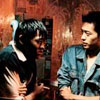 Rebels of the Neon God / Ch'ing shaonien na cha Rebels of the Neon God / Ch'ing shaonien na cha
Taiwan, 1992, 106 min.
Mandarin / English subtitles
Režie / Director:
Tsai Ming-liang
Scénář / Screenplay:
Tsai Ming-liang
Kamera / D. o. P.:
Liao Pen-jun
Produkce / Production:
Central Motion Picture Corporation
Hrají / Cast:
Chen Chao-jeng, Wang Yu-wen, Lee Kang-shen, Jen Chang-bin
This revolutionary film which has changed the character of Taiwanese cinematography tells the story of several young people, whose lives are spent in computer-game rooms and bars, one-shot or dysfunctional relationships and inability to communicate with their parents. All is captured in long, liquid-like shots aiming to portray the current world with as much fidelity as possible. It is a world, where everything that is old only survives as stories and is slowly disappearing together with the generation of our parents. A world rushing forward and at the same time shuffling its feet on one spot.
Tsai Ming-Liang (1957)
One of the extraordinary talents of current world cinematography as seen in his debut, also screened at Filmasia. His films (also screened in the Czech Republic) Vive L'Amour (1994), The Hole (1998), What Time Is It Over There? (2001) or The Wayward Cloud (2005) have won awards at all major film festivals. His specific style of storytelling, controversial choice of subject and emphasis on excentric treatment make his works rank among the best current Asian cinematography has to offer.
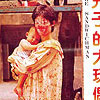 The Sandwich Man / Erzi de Dawan'ou The Sandwich Man / Erzi de Dawan'ou
Taiwan, 1983, 108 min.
Mandarin / English subtitles
Režie / Director:
Hou Hsiao-hsien, Roy Tsang, Wan Ren
Scénář / Screenplay:
Wu Nien-jen
Kamera / D. o. P.:
Chen Kun-hou
Produkce / Production:
Sunny Overseas
Hrají / Cast:
Chen Po-cheng, Yang Li-ying, Ching Ding, Cho Seng-li
This 3-part film captures the onset of liberal economy reflected in the lives of 3 ordinary people. In the first part, a father of a family makes a living as a walking advertisement. In the second part, youths traffic in hard-to-get American products. The protagonist of the third part is a basket of imported apples received as a compensation from the American army. The film is based on short stories by the leading modernist writer Huang Chung-Ming and the screenplay was written by the key author of the so-called New Taiwanese Film, Wu Nien-Jen. The social criticism and portrayal of a person face to face with new ways of life keeps the film alive even today.
Hou Hsiao-Hsien (1947), Wan Ren (1950), Roy Tang (1947)
Hau Hsiao-Hsien first attracted attention as the leading figure of the resurrection of Taiwanese film in the mid 80-ies. His films, some of which are presented at Filmasia, made him one of the most respected current world directors. Wan Ren and Roy Tang shot films mostly in the 80-ies of the past century and are no longer active in the field of feature films.
 Dragon Inn / Long men ke zhen Dragon Inn / Long men ke zhen
Hong Kong / Taiwan, 1966, 111 min.
Mandarin, Chinese / English subtitles
Režie / Director:
King Hu
Scénář / Screenplay:
King Hu
Kamera / D.o.P.:
Hua Hui-ying
Produkce / Production:
Union FilmCompany
Hrají / Cast:
Shangguan Lingfeng, Chun Shih, Bai Ying, Jian Tsao, Han Xue
Director and screenwriter King Hu tells a story from the Ming period, when a group of royal eunuchs decides to eliminate the respected and just official You Chin. Chin is executed based on a fabricated accusation and his family is sent to exile in northern China only to face more danger. There at the mysterious Dragon Gate Inn, travelers and other exiles meet. The struggle for life and freedom is on. This epic and at the same time very personal work was a turning point in the evolution of kung-fu films. The camera departs from its once fixed place, fight scenes take on an almost ballet form and the entire movie is a metaphor of the struggle against the authoritarian communist regime in China.
King Hu (1931-1997)
One of the pioneers of kung-fu film, strongly influenced by classical Chinese opera. King Hu started his career in cinema as an author of wartime anti-Japanese films. Later, he started making so-called wuxia (period kung-fu) films until in the Dragon Inn, he created an entirely new dance-fight movie, which forever changed the genre. He is still admired for his ability to bring together classical Chinese literature, opera, mythology and religion in a dynamic cinematic form.
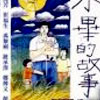 Growing Up / Hsiao pi te ku shih Growing Up / Hsiao pi te ku shih
Taiwan, 1983, 94 min.
Mandarin / English subtitles
Režie / Director:
Chen Kun-ho
Scénář / Screenplay:
Chu T'ien-wen, Hou Hsiao-hsien, Hsu Shu-chen
Kamera / D. o. P.:
Chen Kun-ho
Produkce / Production:
Central Motion Pictures Corporation
Hrají / Cast:
Doze Niu, Zhang Chun-fang
One of the landmark personal films starting the era of the so-called New Taiwanese Film. It is the 50-ies, Xiao Bin lives with his mother who decides to marry a lonely man from mainland China. Xiao Bin is growing up and his family starts facing problems that call for various dramatic and unexpected solutions.
As the screenplay was written by Hou Hsiao-Hsien, the film turns out less of a family drama than an insight into the tense relationships between communities of Chinese immigrants and original Taiwanese and a criticism of the role of women in the Taiwanese society. At the same time, the film shows the Americanization of the island and send deep probes into the psychology of its protagonists.
Chen Kun-Ho (1939)
Director and cinematographer, one of the leading figures of the resurrection of Taiwanese film. Since in the 80-ies, Taiwanese cinematography conquered new audiences both at home and internationally, it has been spawning ranks of prominent film-making personalities. Chen Kun-Ho was the cinematographer of Hou Hsiao-Hsien's first films. Growing Up is his most successful work which caused much sensation and attracted a great interest of the Taiwanese audience.
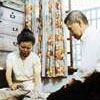 A Summer at Grandpa's / Dongdong de jiaqi A Summer at Grandpa's / Dongdong de jiaqi
Taiwan, 1984, 93 min.
Mandarin / English subtitles
Režie / Director:
Hou Hsiao-hsien
Scénář / Screenplay:
Chu T'ien-wen, Hou Hsiao-hsien
Kamera / D. o. P.:
Chen Kun-ho
Produkce / Production:
Central Motion Pictures Corporation
Hrají / Cast:
Guo Yen-zheng, C. Chen-li, Mei-Feng
Together with his sister, 12-year-old Yung-yung is sent to spend his summer with his grandfather in the countryside. The children's mother is seriously ill. In an unknown environment, the two young protagonists find it difficult to make friends. On the other hand, their life becomes more adventurous and more challenging.
This is perhaps the most charming film by Hou Hsiao-Hsien and despite being somewhat sentimental, the directors formal inventiveness alone is fascinating. Apparently in a movie, the "child's perspective" doesn't always have to be cute.
Hou Hsiao-Hsien (1947)
Born in the Kuantung province in mainland China. His family moved to Taiwan together with the Chiang Kai-Shek army his father served in. He grew up in the countryside among other refugees. In his films, he often returns to this experience. Hou Hsiao-Hsien often take interest in the countryside in general, especially in contrast with the metamorphoses of modern Taiwan. He co-wrote the screenplay to this film with Chu Tien-Wen who still cooperates on HHH's movies.
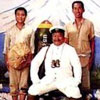 Strawman / Daocaoren Strawman / Daocaoren
Taiwan, 1987, 94 min.
Mandarin, Japanese / English subtitles
Režie / Director:
T'ung Wang
Scénář / Screenplay:
Hung Sung, Wang Siu-di
Kamera / D. o. P.:
Lee Pin-bing
Produkce / Production:
Central Motion Pictures Corporation
Hrají / Cast:
Ke Jun-xiong, Lin Meijiao, Wu Bing-nian, Yang Kuei-mei
The end of World War II is drawing near and Japanese-occupied Taiwan is being bombed by the U.S. One of the bomb hits a field owned by a starving, misfortunate family, but it doesn't explode. Two brothers decide to bring the bomb to the Japanese and gather a reward for it, which would enable them to buy food. This wartime comedy targets not only perverse wartime human relationships, but also the absurdity of daily life at a time of absence of basic ethic and communicational rules. Thanks to its specific depiction of life at the time of war, this film has been tagged the Asian mutation of magic realism.
T'ung Wang (1942)
Unlike most filmmakers of his generation, T'ung Wang started as an author of mostly satirical films. Born to the family of a prominent general of the Chiang Kai-Shek army, T'ung Wang's work is mostly devoted to the criticism of communist dictatorship in mainland China. Among his other historical satires, The Hill of No Return (1992) was awarded at the Shanghai festival.
 Our Time Our Story: 20 Years' New Taiwan Cinema Our Time Our Story: 20 Years' New Taiwan Cinema
Taiwan, 2002, 117 min.
Mandarin / English subtitles
Režie / Director:
Hsiao Chu-chen
In the beginning of the 80-ies, local cinematography was virtually dead in Taiwan. Only genre films were produced with little interest of the audience. Then, a group of new directors most of whom had studied in Europe or the USA came with original ways of storytelling, personal stories of ordinary people and changed the situation beyond recognition. The Taiwanese New Wave lasted nearly 20 years. This documentary gives voice to all key personalities of this movement as well as their successors. Top world cinematographers such as Hou Hsiao-Hsien, Tsai Ming-Liang or Edward Yang reflect on their beginnings as filmmakers, their international success as well as their current situation.
Hsiao Chu-Chen
Hsiao Chu-Chen studied economy, but her interest in the disabled eventually led her to filmmaking. She shot several outstanding documentaries about unjustly persecuted persons, victims of racist violence and also about her family. She is one of the founders of the Taipei Documentary Film Festival. She worked on Our Time Our Story for several months and interviewed over 50 personalities.
 The Peach Blossom Land / Anlian taohuayuan The Peach Blossom Land / Anlian taohuayuan
Taiwan, 1992, 107 min.
Mandarin / English subtitles
Režie / Director:
Stan Lai
Scénář / Screenplay:
Stan Lai
Kamera / D. o. P.:
Christopher Doyle
Produkce / Production:
Long Shong Pictures
Performance Workshop Films
Hrají / Cast:
Brigitte Lin, Li Wei-hui, Gu Bao-ming, Lee Lichun
Two theater companies must share a single rehearsal space. The first company is preparing a contemporary love drama, the other wants to rehearse a classical period comedy. In the theater building. two different ways to approach drama clash in comical situations. However, the two companies soon realize that they are telling the same story of an ordinary person who is forced by the circumstances to leave their home - a typical Chinese theme. The film is the cinematic debut of the leading Taiwanese theater director Stan Lai based on his own book of the same name. The film earned awards in Berlin and Tokyo.
Stan Lai (1954)
Born in the U.S., studied theater directing at the Berkeley University. In Taiwan, Stan Lai began teaching and had a part in shaping the Taipei theater school. He is the author of over 40 successful theater plays and countless theatrical and opera performances. As a play, The Peach Blossom Land was staged in 45 different theaters in Beijing alone. Stan Lai is acclaimed especially for his thought-through characters and his political engagement.
 Terroriser / Kongbu fenzi Terroriser / Kongbu fenzi
Tchaj-wan, 1986, 109 min.
Mandarin / English subtitles
Režie / Director:
Edward Yang
Scénář / Screenplay:
Edward Yang, Hsiao Yeh
Kamera / D. o. P.:
Chan Chang
Produkce / Production:
Central Motion Picture Corporation
Hrají / Cast:
Miao Cora, Gu Bao-ming, Wang An, Jin Shi-jye
The film follows the fates of six different people whose lives intertwine in the streets of Taipei of the 80-ies. A young photographer lives with a female thief. A successful doctor and a successful writer ask about the meaning of their marriage. The last couple is a magazine editor and her boyfriend. The film concentrates on the situations within the different relationships and the protagonists' strenuous effort to be happy and make their significant others' happy as well. Most of the time, they fail. The film, famous not only for its fascinating style of editing, tells about loneliness and the changes inside a society whose fundamental structure hardly resists the pressure of the modern times.
Edward Yang (1947)
One of the most talented and at the same time least known faces of Taiwanese film. He was born in Shanghai, where from his family escaped to Taiwan. He graduated from several technical majors at American universities. At the end of the 70-ies, he decided to return to Taiwan and devote himself to filmmaking. His pictures In Our Time (1983), Taipei Story (1985), Mahjong (1996) and Yi yi: A One and a Two (2000) were among the main attractions at various film festivals and still are being presented at such institutions as the new York Museum of Modern Art.
 Pushing Hands / Tui Shou Pushing Hands / Tui Shou
Tchaj-wan / USA, 1992, 105 min.
Mandarin, English / English subtitles
Režie / Director:
Ang Lee
Scénář / Screenplay:
Ang Lee, James Schamus
Kamera / D. o. P.:
Jong Lin
Produkce / Production:
Ang Lee Productions
Hrají / Cast:
Sihung Lung, Lai Wang, Bo Z. Wang, Deb Snyder, Haan Lee
The debut of the today-famous Ang Lee is a comedy view of the clash of the Western and Asian cultures. The tai-chi teacher Mr. Chu move from China to the U.S. to be with his son. His lifestyle immediately clashes with the comfort his son's wife, a neurotic writer, has gotten used to. Mr. Chu must come to the decision to move to his own place and start over on his own. Comical situations and family values are the greatest assets of the picture, as Ang Lee managed to avoid a whole set of clichés this kind of story tempts to.
Ang Lee (1954)
Born in Taiwan, where he graduated from the National Taiwan College of Arts in the field of film-making. He then went on to study in th U.S., where he later started his career. His second film, The Wedding Banquet (1993), won in the competition at the Berlin festival. Successful pictures followed, which even the Czech audience had a chance to see: Sense and Sensibility (1995), The Ice Storm (1997) and Crouching Tiger, Hidden Dragon (2001). In 2005, his Brokeback Mountain collected over 40 awards, including the top award from the Venice festival and 3 Oscars.
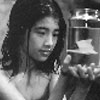 Tropical Fever / Redai yu Tropical Fever / Redai yu
Taiwan, 1995, 98 min.
Mandarin / English subtitles
Režie / Director:
Chen Yu-hsun
Scénář / Screenplay:
Chen Yu-hsun
Kamera / D. o. P.:
Liao Pen-Jung
Produkce / Production:
Central Motion Picture Corporation
Hrají / Cast:
Wen Yin, Lien Pi-Tung, Lin Cheng-sheng, Shi Ching-Luen
Ah Jiang is studying for an important set of exams to advance to a higher grade in high school. However in his class, he ranks among the lower achieving and his classmates miss no opportunity to remind him. He finds escape in video-game rooms. One day, he witnesses the kidnapping of a young boy and decides to save him. The kidnappers seize him, too and under dramatic circumstances, the entire group arrives in the countryside, where it turns out, that things are somewhat less dramatic than they had seemed. This poetic comedy draws attention to the unnecessary gap dividing the Taiwanese society into the effective and the useless.
Chen Yu-Hsun (1962)
Originally studied book sales, but in the beginning of the 90-ies started working as a screenwriter for the Taiwan television. He authored numerous TV series and sitcoms. After a long hesitation, Chen Yu-Hsun wrote the screenplay for Tropical Fever, which won him a government award. The major theme of his film, as well as his other work, is the disintegration of traditional values and the disappearance of character of the Taiwanese lifestyle.
Contemporary Taiwanese cinema
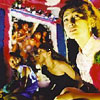 Splendid Float / Yan guang si she gewutuan Splendid Float / Yan guang si she gewutuan
Taiwan, 2004, 72 min.
Mandarin / English subtitles
Režie / Director:
Zero Chou
Scénář / Screenplay:
Zero Chou
Kamera / D. o. P.:
Liu Yun-Hou
Produkce / Production:
The 3rd Vision Films
Hrají / Cast:
James Chen, Zhuon I-chin, Mo I-hong
Roy leads a double life. At daytime, he is a taoist monk attending to funerals, at night, he roams the beaches as drag queen Rosa. During one of his performances singing on playback with other drag queens, he meets Sunny. Their passionate love is however ended by an accident during which Sunny drowns. Roy is to conduct the final rites for him. For this purpose, he chooses a beautiful place amidst high rocks. Can love defeat death? In the film, it is difficult to separate the main protagonists fantasies from his real life. This very poetic and colorful film has been presented at over 30 world film festivals.
Zero Chou (1969)
Studied philosophy and was lead to film-making by her interest in the relationship of film and reality. She earned success mostly with her documentaries and her writing. Splendid Float is her full-length cinematic debut.
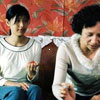 Blue Cha Cha / Shen hai Blue Cha Cha / Shen hai
Taiwan, 2005, 108 min.
Mandarin / English subtitles
Režie / Director:
Cheng Wen-tang
Scénář / Screenplay:
Cheng Wen-tang, Cheng Ching-feng
Kamera / D. o. P.:
Lin Cheng-ying
Produkce / Production:
Green Light Film Ltd
Hrají / Cast:
Su Hui-lun, Lee Wei, Lu Yi-ching, Leon Dai, Huang Wu-shan
Ah Yu is returning from prison and slowly starts to reintegrate into normal life. She is being helped not only by Anna, whom she met as an inmate, but also by her two new lovers. One of them is a businessman, the other works at the same factory as Anna. Neither relationship lasts long, so Ah Yu turns to Anna again, with whom she has an almost sisterly relationship. Who is going to help her find the meaning of her existence? This is a poetic film dealing with the very possibility to live a happy life in today's society and the search for one's identity, which the same society sometimes makes unnecessarily complicated.
Cheng Wen-Tang (1958)
Started working in the film industry in administrative positions, then as assistant director, producer and a screenwriter. In 1982, he started directing. He poetic full-length debut Somewhere Over the Dreamland (2002) won the Golden Horse Award for the best Taiwanese picture of the year and was screened within the scope of the Critics' Week at the Venice festival. His following films were Passage (2004) and Blue Cha Cha, both of which only testify to his talent.
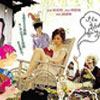 The Shoe Fairy / Renyu duoduo The Shoe Fairy / Renyu duoduo
Taiwan, 2005, 94 min.
Mandarin / English subtitles
Režie / Director:
Robin Lee
Scénář / Screenplay:
Robin Lee
Kamera / D. o. P.:
Chin Ting-chang
Produkce / Production:
Focus Films Co. Ltd., Three Dots Entertainment Co. Ltd.
Hrají / Cast:
Vivian Hsu, Duncan Chow, Lee Kang-yi, Tang Na
Once upon a time, there was a little girl called Dodo. As a child, she was unable to walk, but a surgery solved her problem. Since then, she has grown up to be a beautiful young lady who loves shoes. It is the shoes that eventually lead her to an unexpected encounter with a young man named Smiley. They would have lived together happily ever after, had it not come to the point when because of lack of space, Dodo had to stop buying new shoes. This kind movie has traveled from one Asian film festival to another and formally reminisces Amelie de Montmartre. The lower budget it had, the more honest and inventive it turned out.
Robin Lee (1972)
Studied animation at the Taipei university. She has been active in the film industry since the early 90-ies. She worked as assistant director in both television and film productions. Later, she started writing successful screenplays, which she eventually decided to direct herself. The Shoe Fairy is her full-length debut.
 Formula 17 / Shi qi sui de tian kong Formula 17 / Shi qi sui de tian kong
Taiwan, 2004, 93 min.
Mandarin / English subtitles
Režie / Director:
DJ Chen
Scénář / Screenplay:
Rady Fu
Kamera / D. o. P.:
Chen Huei-Sheng
Produkce / Production:
Three Dots Entertainment Co. Ltd.
Hrají / Cast:
Tony Yang, Duncan, King Chin, Dada Jl, Jimmy Yang
Tien is a 17-year-old, inexperienced boy. Full of expectations, he comes to Taipei to enjoy his summer in a big way. He falls in love with the attractive architect Bai who is known by his promiscuity. Thus, the naive and lovestruck Tien discovers the downsides of life in the big city as well as the downsides of his new boyfriend's character. This charming comedy breaks the taboos surrounding homosexuality in Asian film, became the top-visited feature in Taiwan theaters leaving behind even American blockbusters. On the other hand in Singapore, the film was immediately banned as it offers "an illusion of a homosexual utopia".
D.J. Chen (Yin-Jung Chen) (1980)
A representative of the new generation of Taiwanese filmmakers concentrating on commercial production, looking for unusual approaches to film and citing Tsui Hark, Charlie Chaplin and Stephen Chow as their role models. In 2002, D.J. Chen directed a short entitled Sorry Spy, which earned her general recognition. The gay comedy Formula 17 is her full-length debut. Her second picture, Catch Me (2006), is also a comedy, this time about current Taiwan.
 Heirloom / Zhaibian Heirloom / Zhaibian
Taiwan, 2005, 99 min.
Mandarin / English subtitles
Režie / Director:
Leste Chen
Scénář / Screenplay:
Dorian Li
Kamera / D. o. P.:
Kwan Pung-leung
Produkce / Production:
Three Dots Entertainment Co. Ltd.
Hrají / Cast:
Terri Kwan, Jason Chang, Chang Yu-cheng, Tender Huang
James is engaged to Yo and together, they move into the house of James' uncle who mysteriously disappeared twenty years earlier, together with his entire family and all who were present in the house at the moment. The couple invites their friends Yi-Chen and Ah-Tseng. Strange things start happening in the house and old wounds begin to open. Evil is not absent in the house. It resides on the 4th floor.
The renaissance of Asian horror has arrived in Taiwan. The film has been purchased for distribution not only in the entire Asia, but also in the country of our Polish neighbors. One of last year's commercially most successful Taiwanese films.
Leste Chen (1981)
A member of the youngest generation of Taiwanese directors. Still, his films draw international attention. Unlike his "teachers", Leste Chen film stay far from personal social criticism. On this subject, he comments: "we are a generation excited whenever there is anything new in the movie theaters. We want our films to have the exact same effect on the audience." Leste Chen started as a director of music videos and his sense of music and rhythm strongly shows in his films as well.
 Catch / Guoshi wushuang Catch / Guoshi wushuang
Taiwan, 2006, 120 min.
Mandarin / English subtitles
Režie / Director:
DJ Chen
Scénář / Screenplay:
DJ Chen
Kamera / D. o. P.:
Chen Huei-Sheng
Produkce / Production:
Three Dots Entertainment Co. Ltd., Serenity Entertainment International
Hrají / Cast:
Tony Yang, Tien Hsin, Chin King, Tsuyoshi Abe, Jaline Yeh
The story of the action comedy revolves around corruption, Taipei gangs, short-lived celebrities and tabloid press. The main protagonist is Gene, whom the police send to infiltrate one of the gangs just when the mysterious and masterful Alpha announces his comeback to crime. Other gangs step in along with the tabloid press, which starts to take interest in the life of gangsters. Current Taiwan is thus reflected in an entertaining, funny film, which has broken local popularity records. Fighting action is not only a way to entertain the audience, but also a attempt to reflect the society in a modern way.
D.J. Chen (Yin-Jung Chen) (1980)
A representative of the new generation of Taiwanese filmmakers concentrating on commercial production, looking for unusual approaches to film and citing Tsui Hark, Charlie Chaplin and Stephen Chow as their role models. In 2002, D.J. Chen directed a short entitled Sorry Spy, which earned her general recognition. Her debut Formula 17 met with exceptional success. Catch Me is her second full-length film.
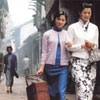 Love´s Lone Flower / Gu lian hua Love´s Lone Flower / Gu lian hua
Taiwan, 2005, 109 min.
Mandarin / English subtitles
Režie / Director:
Tsao Jui-yuan
Scénář / Screenplay:
Pai Hsien-yung
Kamera / D. o. P.:
Chin Ding-tsang
Produkce / Production:
Tsao Films Production
Hrají / Cast:
Anita Yuen Wing-yi, Lee Sin-chet, Hsiao Shu-shen, Tou Chuang-hua
It's Shanghai in the early 40-ies. The world is ravaged by the war, but the city keeps its decadent bars and an enchanting avant-garde atmosphere. Yuenfang dances works as a dancer in a bar and is having an affair with musician San-Lang and singer Wubao. Their fates take a twist when they have to flee from the communists and end up in Taiwan. The pre-war years are remembered in nostalgia in Taipei bars of the 60-ies. Yuenfang meets young Juanjuan and her love to long-dead Wubao is renewed. This sensitive epic film perfectly resuscitates the "old" world not only thanks to the sets, but also its atmosphere and a strong love drama.
Tsao Jui-Yuan
Director, actor and producer. Love's Lone Flower is his full-length debut and was screened at many film festivals. He created a successful TV adaptation of the novel Crystal Boys describing the birth of the gay community in Taipei of the 70-ies.
The Passage / Jing Guo
Taiwan, 2004, 105 min.
Mandarin, Japanese / English subtitles
Režie / Director:
Cheng Wen-tang
Scénář / Screenplay:
Cheng Wen-tang, Cheng Ching-feng
Kamera / D. o. P.:
Chen Huai-en
Produkce / Production:
Green Light Films, National Palace Museum
Hrají / Cast:
Guey Lun-mei, Leon Dai, Yukihiko Kageyama, Tian Fong
Ching works at a museum. Dong-Heng writes studies on historical manuscripts. Ichiro comes to Taiwan from Japan to see a precious manuscript from the 11th century Ching and Dong-Heng are studying. It is not an ordinary manuscript. It was written by the free-minded poet So Dong Po while in exile. In the beginning of the 20th century, the manuscript was taken to Tokyo and after the war, it was returned to Taiwan. It turns out that all three protagonists have a very special relationship to this piece of writing. We are used to keeping "the great history" shut in museums and galleries. However, its connection to our lives can be all too concrete.
Cheng Wen-Tang (1958)
Cheng Wen-Tang worked in the film industry in administrative positions, as assistant director, producer and screenwriter. In 1982, he started directing. He shot a series of ethnographic documentaries about the life of the original population who today stand somewhat outside the Taiwanese society. His full-length debut Somewhere Over the Dreamland (2002) won the Golden Horse Award for the best Taiwanese picture of the year and was screened within the scope of the Critics' Week at the Venice festival.
Documentaries and student films
 Jump Boys / Fan gun ba! Nan hai Jump Boys / Fan gun ba! Nan hai
Taiwan, 2004, 84 min.
Chinese, Mandarin / English subtitles
Režie / Director:
Lin Yu-hsien
Even Czech TV audience is occasionally treated to a coverage of world gymnastics competitions. The athletes are younger, more dexterous than used to be customary and it may seem that due to constant training they have no time for a normal life. This playful documentary follows the fates of several 8-to-9-year-old boys who spend most of their free time training gymnastics, but still are able to help their parents, entertain their schoolmates and most of all, dream about their success to come. At the first sight a slightly bizarre video, but this movie offers a view of the beginning of careers of future top-notch athletes and also shows to what extent is gymnastics popular in Taiwan.
Lin Yu-Hsien (1974)
Graduated from the Taipei university in the field of management. Gradually, he started taking courses in film production eventually to develop a relationship to documentary film. He worked for an advertising agency and later as an assistant director in feature-film productions. Jump Boys became on of the most popular films of the year and won its author a whole range of awards.
Let It Be
Taiwan, 2004, 84 min.
Chinese, Mandarin / English subtitles
Režie / Director:
Lin Yu-hsien
Times were hard in Taiwan after 1949. Thousands of refugees fled to this mountainous island escaping the communist army. Still, Taiwan became a fully self-sufficient country in, for example, rice production. This documentary follows the daily life of old farmers, whose lifestyle and rhythm has not been affected by any of the turbulent changes in the Taiwanese society. tradition, hard work - an almost lost world, which has been keeping the entire society alive for almost 60 years.
Yan Lan Chuan (1965)
Studied philosophy and sociology. She acquired her film education in Great Britain. In 2002, she shot a film about the fates of the people affected by the catastrophic earthquake of 1999. She mostly takes interest in the Taiwanese countryside. Juang Yiu-Tseng (1966) also studied philosophy and in the meantime is concluding his studies of documentary film.
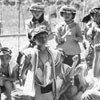 Rytmus vesnice Wulu / The Rhythm in Wulu Village Rytmus vesnice Wulu / The Rhythm in Wulu Village
Taiwan, 2003, 75 min.
Mandarin, Chinese, Bunun, English / English subtitles
Režie / Director:
Wang Chung-shung
In the mountainous eastern part of Taiwan, there is a village named Wulu. Its original inhabitants are known especially for their non-typical music. As any traditional communities, the Wulu must face the pressure of the modern society. They decide to protect their culture. In schools, they teach their original language, dance and singing. Taiwan can be considered a socially and ethnically diverse environment. Thousands of Chinese refugees, long presence of the American army and immigrants from neighboring Asian contries shape the Taiwanese politics, economy, popular culture and to a large extents, the arts. How do the original inhabitants deal with this pressure? Is anybody interested in their culture at all?
Wang Chung-Shung
Studied film directing in San Francisco. After returning to Taiwan, he worked as assistant director on both featuer and documentary films. The Rhythm in Wulu Village is his full-length documentary debut. According to his own words, he did not won't to intervene with the lives of the villagers too much, so the audience is offered a strong, authentic experience of a different culture, which the director never ceases being fascinated by.
Taipei´s Bohemians: The Life of Theatre
Taiwan, 2003, 75 min.
Mandarin, Chinese, Bunun, English / English subtitles
Režie / Director:
Wang Chung-shung
Even if it were alone for its selection of protagonists, this documentary about current Taiwanese theater deserves attention. Instead of representative faces theaters offer to its audiences, the director of this film focuses on six people of different professions. They may not be as visible under normal circumstances, but without their passion, determination and stubbornness, quality theater could never exist. We meet directors, actors, set designers and clerks. Often, several of these professions are handled by a single person. What are their problems? What is the situation of modern art theater in Taiwan?
Hung Hung (1964)
Writer, poet, playwright, critic, film a theater director, whose films collect awards at festivals in Europe and Asia. Taipei Bohemians is his first full-length documentary, thanks to which he temporarily returns to the world of theater.
Taipei National University of Arts present: A Collection of Student Films
4ever Kids
2005, 112 min., written and directed by Wang Cheng-Yang
4 Children share a similar fate. Their fathers fish on the sea. Their mothers are of foreign origin. What are their inner worlds like?
Breasts
2004, 11 min., written and directed by Chiang Hsiu-Chiung
Should women be ashamed when they breast-feed their children in public? A female film about women's problems and men's taboos.
Follow You Wrong
2005, 26 min., written and directed by Luke Chen
Young Mao-Di spends his whole nights sitting at a computer tweaking digital photographs. One day, he meets the girl of his dreams on the metro. follows her and finds out that she lives across the street. the next day, he is followed by an older man, who lives in the same house as the girl. Mao-Di sets out to discover who the two are.
Happy New Year
2005, 5 min., written and directed by Wang Cheng-Yang
An experimental message to the parents. Or the life in the big city as seen by a homesick young director.
How's Life?
2005, 30 min., written and directed by Tommy Yu
The corpulent, middle-aged protagonists decides to end his suffering by committing a suicide. After a few pitiful attempts, a woman selling encyclopedias rings his doorbell and the drama turns into a comedy.
Numbers
2005, 28 min., written and directed by Cheng Hsiao-Tse
Shy clerk Douglass is ridden by bad luck. He would like to be rich, but his work bores him. So does his lifestyle. One night in his dream, he sees six numbers which are to change his life. The lottery with the highest jackpot in history is about to close the ticket offices...
She Says...
2005, 6 min., written and directed by Lin Chun-Hua
A bizarre animated film about a girl, who fell out of a toilet. |


